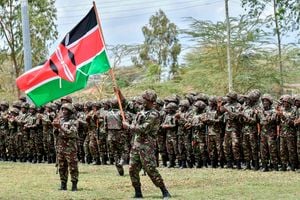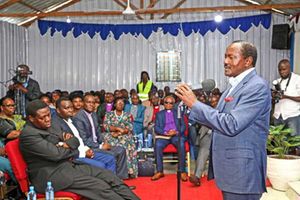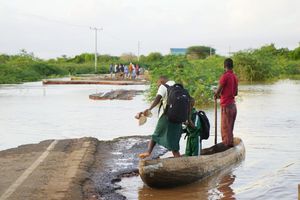The Cord and Jubilee divide
What you need to know:
Mr Mbadi said if any change had to be made to the laws that were made through a negotiated process, they then would need to sit and go through the same process for any amendment.
He was referring to the 14-member team that brokered the exit of the electoral commissioners and also came up with proposals on how to conduct the 2017 General Election.
As the bickering continues over proposed amendments to the laws that will govern the 2017 elections, the Nation spoke to ODM chairman John Mbadi and has followed up on the arguments by National Assembly Majority Leader Aden Duale in the House on why they support or oppose the changes.
“If any change has to be made to the laws that were made through a negotiated process, we then need to sit and go through the same process for any amendment,” Mr Mbadi said. He was referring to the 14-member team that brokered the exit of the electoral commissioners and also came up with proposals on how to conduct the 2017 General Election.
Proposal to allow the electoral commission have a manual backup in case deployed technology fails
Mr Aden Duale: We need to ensure that, through the laws we make, we do not impede anyone’s constitutional right to vote. What happens, for example, when a voter goes to a station and is told that the machine has failed and cannot identify him? Do you send him or her home?
Two, at least 25 per cent of Kenya — over 2,000 sub-locations — have no network coverage. How do you expect to transmit results from there? In North Eastern, terrorists are bringing down masts.
We need an accurate, verifiable, secure, accountable and transparent backup.
Mr John Mbadi: The moment we give space to the electoral commission that technology will fail, then you are already saying that the system has no integrity. We wanted technology to assure ourselves of credible polls. We cannot have invested a lot of money in a technology that will fail.
The electoral commission just needs to be careful enough. Because, let’s be honest, planes do crash while flying, but you will never hear anyone propose a manual solution, right?
Proposal to increase maximum number of voters per polling station from 500 to 700
Mr Duale: The electoral commission has made proposals that the figure 500 is too small and it would not make sense to increase polling stations from the current 44,000 to 57,331 to meet the threshold at a huge cost.
The figure 700 is a reasonable number of voters in one station.
Mr Mbadi: The figure 500 was arrived at after experts sat, determined the minutes one voter will take in a polling booth, and you cannot just wake up and say you want it at 700. Unless otherwise explained through the same process, we do not want to run the risk of voters being locked out because of the high number of people.
Proposal to discard Elections Campaign Finance Regulations that set limits of spending and requires candidates to open campaign accounts and name managers by December 8
John Mbadi: The regulations are unimplementable and they have problems. But then again, we still need to agree on the next move forward, and most importantly, what next after the rejection?
Proposal to defer requirement for MPs to have degrees in the 2017 polls to 2022; MCAs to have diploma to 2022
Mr Duale: The proposal has gone through the required consultations and has been backed by members from the two political divides.
Mr Mbadi: We still require debate on this. And yes, we are getting late with this law to pronounce ourselves on academic qualifications for the various seats.





